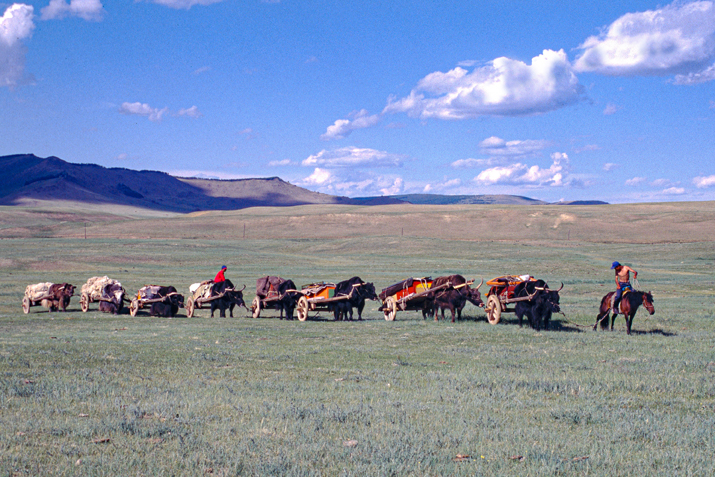
Mogi the sheep killer
N 48°56'688'' E 102°07'935''
Day: 47
Sunrise:
06:38
Sunset:
19:39
As the crow flies:
23,73
Daily kilometers:
30
Total kilometers:
609
Soil condition:
Meadow
Temperature – Day (maximum):
27 °C
Temperature – day (minimum):
23 °C
Temperature – Night:
minus 2
Latitude:
48°56’688”
Longitude:
102°07’935”
Maximum height:
1248 m above sea level
Time of departure:
11:10
Arrival time:
20:10
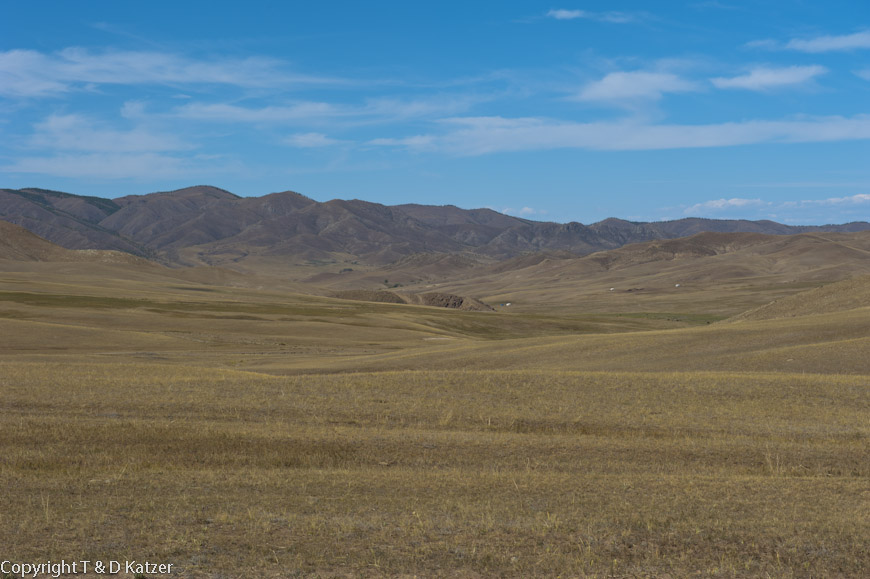

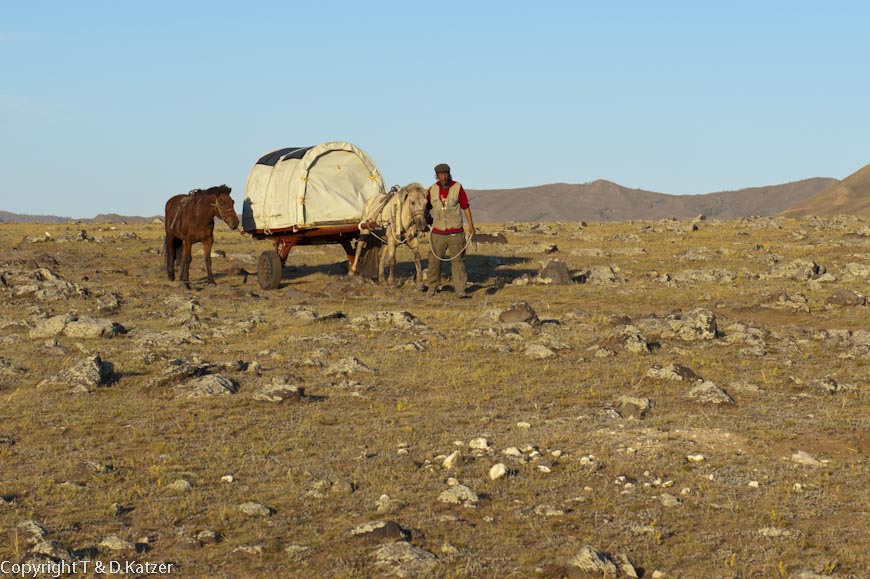
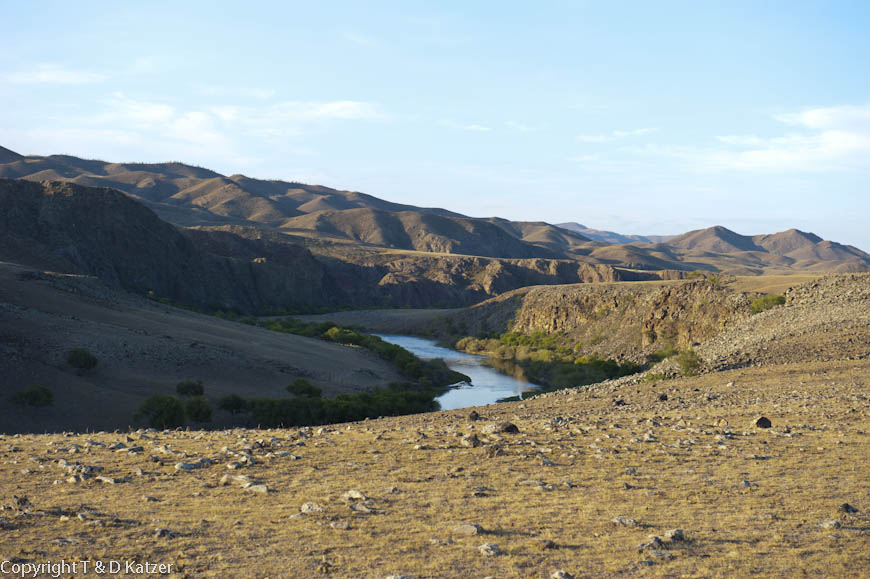
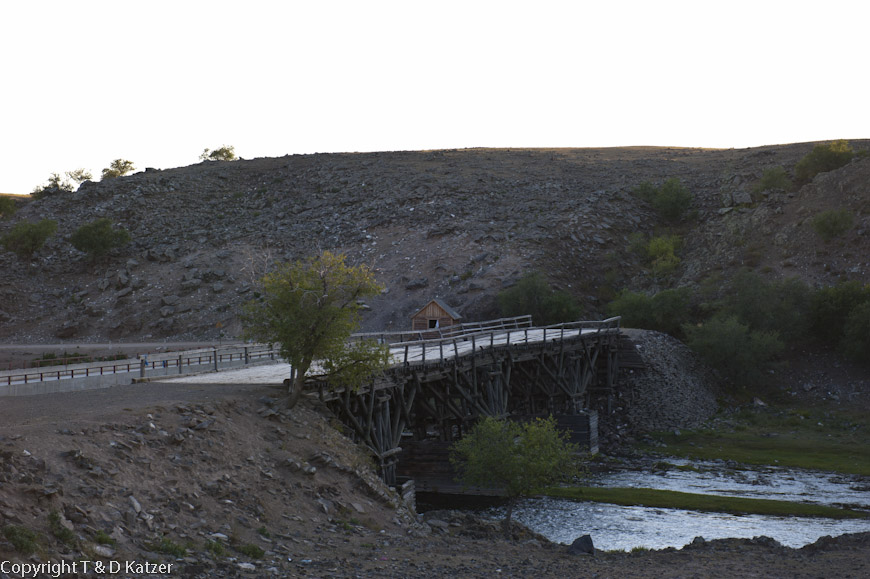
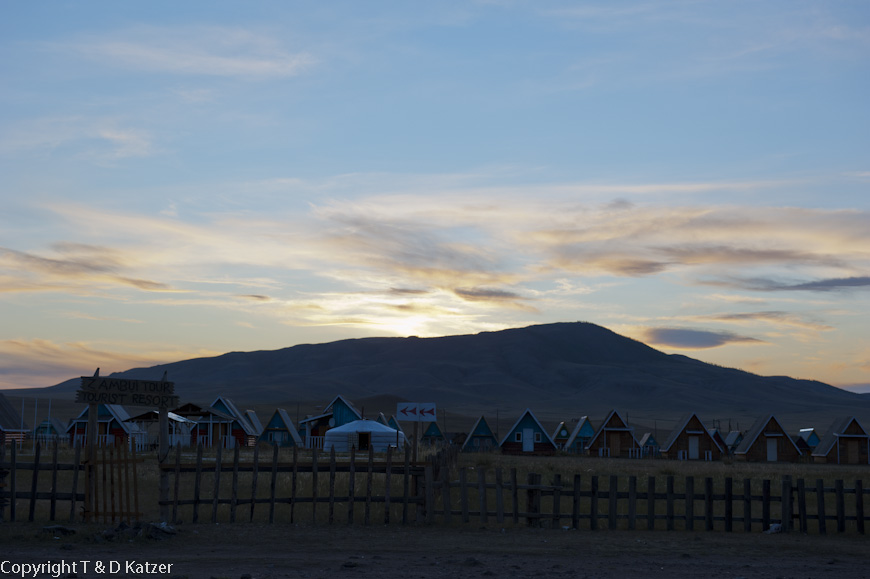
Wake up Ulzii again this morning. It takes ages for him to peel himself out of the tent. “Shall I wake you up a little earlier tomorrow? Then you’ll have more time to do your work, such as putting the tent together, assembling the tent and watering the horses?” I ask kindly, because if no one has to wait for anyone else, we have the chance to set off a little earlier. “Yes,” he replies curtly.
Despite its slowness, we set off at 11:10 am. That’s a relatively good time compared to other times. I’ve been asking Bilgee to lead the draught horse from the horse for days. This would mean we would be much faster than if he were walking. But Bilgee wanted to get used to the horses and their characters first. A very wise decision as Sharga, for example, is unpredictable and it’s better to have both feet on the ground in the event of an unforeseen outburst. But now we know the horse and yesterday I had the feeling that it was time to pull it from the saddle. Bilgee complied with my request and tried it out with boron yesterday. That worked really well and we were able to cover a longer distance of 30 kilometers per day despite the mountain passes. In general, I’m not interested in covering a lot of kilometers in a short time, but in reaching our destination before the cold weather sets in. So even in a country where the clocks tick differently, we have a certain time pressure imposed by nature.
As Bilgee wants to reach his good hunting grounds today, he starts the day with an easy trot. He seems to have taken my request to cover a few more kilometers very seriously, because we really have to make an effort to keep up the pace. As an inexperienced rider, I have to admit that after two hours I longed to finally be able to walk normally again. But my pride doesn’t allow me to ask Bilgee to reduce the speed. And then there’s today’s heat. The thermometer shows over 30 degrees in the sun. The country is really difficult to understand. Tanja and I stop for a moment and take off one of our woolen undershirts. Then we mount up again and gallop after the horse-drawn carriage as it pulls away. Despite his bitchiness, Sharga is a strong and willing draught horse. I am amazed at the stamina with which he pulls the car.
At 13:30, after 2 ½ hours of continuous trotting, we stop for a lunch break. Once again we lie down in the meadow to drink our tea and eat some cookies. Then it goes on. We cross two mountain passes with climbs to recover from the trot. Nevertheless, Tanja and I are really enjoying riding for the first time today. Whenever we fall behind while taking photos, we gallop after the horse-drawn carriage. We have a real race which Tanja usually wins. Her horse Naraa is a real racehorse and can’t stand being overtaken. Naraa flies over the prairie and is therefore hard to beat. But my horse Sar is also a wonderful animal. I’ve never had such a fantastic mount. It is completely independent of the group and always follows my will. Even when I go off to film on a hilltop, get out of the saddle and do my job, it stays faithfully by my side. I always put the hobbles on so as not to lose him. So far, however, Sar has had no trouble following his horse colleagues.
We ride through a wide valley. There is volcanic rock everywhere, making the ground difficult for the hooves. It’s good to have replaced Bor and Sharga’s missing horseshoes. As there are no sheep or goats to be seen for miles around, we let Mogi off the lead. He is delighted to have regained his freedom and jumps across the prairie like a buck. Then he races ahead, only to come back to us a little later. Most of the time he runs alongside one of us. A herd of sheep and goats appears in the distance. We barely notice them. Mogi seems to have spotted them too and when he suddenly shoots in their direction like an arrow, we know we’ve made a mistake. Tanja and I follow him at full gallop. Nevertheless, Mogi reaches the herd before we do. He hits the wildly rushing animals like a bullet. They bark, mow and bleat wildly and the startled grass-eaters storm back and forth in various formations like a swarm of bees gone wild. In a flash, Mogi has knocked over a small sheep and is shaking it by the neck. Tanja arrives to save the little one’s life. Mogi lets go of his victim, who shakes himself after a few seconds of fright and runs off bleating. Mogiii! Come back!” we shout at the top of our lungs as he plunges back into the herd and tries to find another victim. I immediately get back into the saddle and gallop after him. I see Mogi grab a larger sheep by the tail and expertly round it. Then he goes for its throat to kill it. I jump out of the saddle and drag Sar behind me to save the sheep. But Sar suddenly refuses to run on. “Come on! Now run!” I yell, tugging at the halter rope while Mogi works on his victim. I am tempted to let my horse go, but remember my expensive camera equipment in the saddlebags. Another attempt to get my horse to walk is successful and I reach our frantic dog and the sheep I thought was dead. I pull Mogi off his prey with all my might, yank him into the air and throw him to the ground. As soon as he lies there, he wants to pounce on his prey again. I grab him by the throat and throw him several times onto the ground. He starts to whimper. Then I grab him by the collar and fasten the collar. Mogi starts to rattle. “The dog must be shot. You can’t tear with a dog like that. He’ll only cause problems. He was born in the city and will never get used to sheep and goats,” I hear the voices of the previous day as I strangle his neck. Before he chokes, I let go again. I look into his brown eyes and see mortal fear in them. Even though he’s a sheep-killer, I feel sorry for him. I still have him in a stranglehold when Tanja gallops up. A motorcycle comes roaring up behind her. It’s two shepherds. “Hojor hon!” (“Two sheep!”) they shout angrily. “Yes, Hojor hon,” we confirm. “Uutschla (excuse me),” I say, completely out of breath, handing the dog over to Tanja, who immediately puts him on a lead. The shepherds are furious and immediately want money. In the distance we see Ulzii riding up. We point to him and ask the angry shepherds for a little patience. When Ulzii arrives, we apologize again. “They want money for the sheep,” Ulzii translates. “We understand. I want you to catch the two injured sheep for us. I want to see if they have suffered life-threatening wounds. If so, we’ll be happy to buy the animals from them,” I say. It looks as if both sheep have survived Mogi’s attack without any visible injuries. If the hoofed animals were limping around bleeding or twitching in front of us, we would have paid the shepherd for the animals immediately. But there is a good chance that they will all get away with it.
We tell the shepherds at the cart to wait for them. The more aggressive of the two immediately jets off to his yurt on his motorcycle and comes roaring up to our horse-drawn cart in his four-wheel-drive bus. Ignoring the request to bring us the injured sheep. “They seem to have money,” says Tanja, pointing to the car in which the man with a serious expression and his wife and child are sitting.
“I want 150,000 tugrik (€85) per sheep,” says the unsympathetic man in a tone of voice that brooks no argument. “150,000 tugriks? That’s a crazy price. We recently bought a full-grown goat for 50,000 tugrik (€29). “We’ll never pay 150,000,” I translate. I ask Ulzii and Bilgee to withdraw for a short consultation. “What is the normal price for a sheep?” I ask Bilgee. “A maximum of 90,000 tugrik.” (51;- €) “And how much can a lamb cost?” “Maybe 40,000 or 50,000 tugrik.” (23,- € or 29,- €) “That means he charges twice the maximum price?” “Yes,” answers Bilgee. I have Ulzi translate for both animals to pay no more than 140,000 Tugrik (80,- €). But only if both are really injured. I want to see the animals. Then we all decide the extent of the injury together and if it turns out to be more than scratches, we pay 140,000 Tugrik. The shepherd shakes his head vigorously and wants 150,000 tugrik per animal. I understand the reason for his anger, but I don’t accept being cheated. Again, I reject his exaggerated demands and stick to my statement that I want to see the animals. The fronts are hardening. Then one of the shepherds and his wife go off to look for the injured sheep in the flock. “Our meat supplies are running out anyway. So it’s no problem to buy the sheep. But not at this price. Do you agree?” I ask our companions. You nod in confirmation.
Then we ride on. “Did you tell the shepherd that we’re riding on and that he should bring the sheep to the camp?” I ask Ulzii. “Yes, we did.” But as we pass the herd, Bilgee says we should ride back to the shepherds. In the meantime, Tanja keeps an eye on the cart. Once there, the shepherd asks me to look for the sheep. “How am I supposed to find the injured sheep? I’m not a shepherd. They all look the same to me,” I reply, surprised at this request. Meanwhile, the woman and the man are still looking for signs of injured sheep in the flock. But without success. “It’s a dry fall. When the sheep are bitten, they die,” laments the man with his exaggerated demands. “That’s all right. I buy the injured sheep. I only don’t buy them if they’re not injured. Then it’s just a reason for you to make money,” I reply. “I won’t sell you the sheep for 140,000. You pay me 140,000 and move on,” I hear and can’t believe my ears. “You want me to pay 140,000 and then not get a sheep?” “Yes,” the man replies challengingly. Again I have my offer translated and again the nomad refuses. “He’s crazy,” says Ulzii. “I agree with him. But we have to find a solution.” I try to remain as calm as possible in a situation like this and have my offer translated again. “No,” says the greedy neck. “Well, then we’ll have to settle the situation in front of the police. I’m not going to let him take the money out of my pocket. He could ask for any fantasy price. In the end, he wants a million,” I decide. “How much does your horse cost?” the glutton now wants to know. “What does my horse have to do with the two sheep?” How much does your horse cost?” he asks me again. “How much does your car cost?” I ask the same stupid counter-question. “6 million” (€3,428), he fibs, as a car here costs ten times that amount, unless it’s an old jalopy. After telling me the price of his tin can on wheels, he still wants to know the price of Sar. I simply ignore this question and return to the negotiation. But the man remains adamant. “Leave it alone Denis. There are no injured sheep so we can go,” Bilgee intervenes, climbs into the saddle and rides back to the cart. Meanwhile, the other nomad gets on his motorcycle with his wife and rides off. It seems they have also had too much of this strange negotiation.
I’m not paying 150,000 Tugrik for a lamb. Especially when there is obviously no injured lamb. 300,000 for both animals is almost the price of a horse. That’s impossible,” I continue the unpleasant argument in order to find a solution after all. “If you don’t make sense now and charge me the normal price, I’ll leave,” I translate and set about removing the hobbles from my horse. Then something happens that shouldn’t happen. The shepherd puts his hand on my horse’s reins and tries to forcibly stop me from riding on. I am now boiling with anger. “No violence,” I think to myself. “This has to be resolved peacefully. I can’t possibly knock this man down. First our dog bites his sheep and then I hit myself. No, no, no, there has to be another way,” my thoughts race through my brain. I very slowly take his hand and gently push it off my horse’s back. I say in a very serious tone of voice: “This man here will not touch my horse again.” Then I take off my glasses so that he can look me in the eye and understand the seriousness of my statement. He immediately withdraws his hands, whereupon I take the reins and mount the horse. Then I pretend to ride off, but stop after 20 meters and turn around. “So, is there a fair and reasonable decision now?” I ask. In the meantime, the shepherd has gone to Ulzii’s horse and taken the reins in his hands. “Ulzii! He’s not allowed to touch your horse either. That’s a no-go. Absolutely impossible. You belong to me. No stranger from my crew is allowed to touch the horses or prevent you from riding on. We should settle the matter before the police,” I bluff, knowing that the civil servants, if there are any out here, are often corrupt and can make a matter much more difficult than it already is. “I want medicine for the sheep,” the shepherd suddenly changes tactics to get money out of me. “Medicine? Okay. We can talk about that. How much tugrik?” “70,000 tugrik”, (€40) “My God. So he wants more money for medicine than a lamb costs? That simply can’t be right. Come on, let’s go. He’s not getting anything from me,” I bluff again and ride off, only to rein in Sar after 20 meters. I’ll pay 20,000 tugrik.” (11,- €). “I get 70,000 tugrik or go to the police. You wait here for so long,” orders the man I would now like to jump on. “I’m not paying 70,000 tugriks and I’m not staying here. If you don’t make me a reasonable offer in two minutes at the latest, I’ll leave and you’ll have nothing,” I translate. The shepherd is now visibly cornered. “60,000 tugrik!” (€34) he shouts. “35,000 is my last offer!” “50,000!” he demands, whereupon I swing myself into the saddle once again and ride 20 meters away to wait for a new offer. My patience is at an end as I gallop back: “37,000 and no more Tugrik!” I hurl out the amount and this time I’m actually willing to call it off. “Okay!” the creep shouts in response to my suggestion. “Tell him to pick up the money at the horse-drawn cart,” I shout and gallop off. Ulzii swings into the saddle and hurries after me. As soon as we reach the horse-drawn cart, the greedy neck arrives. I briefly explain the situation to Tanja. She looks for the money and gives it to me. “It’s best if you take a photo of the money handover. Then we’ll have proof. Otherwise we don’t know what else this man will come up with,” I say to Tanja, who grabs the camera to take a photo of me handing over the 37,000 Tugrik. The man and his wife immediately put their hands up to their faces to remain unrecognized. Apparently they do have a guilty conscience now. The guy almost flips out. He’s shouting and wants to hit himself. Then he tries to snatch the money out of my hand. I quickly pull it back so Tanja can take another photo. Once again the hand snaps out of the car like the slashing claw of a bird of prey. This time I have the bills snatched from my hand. The man jumps out of the car, storms towards me and asks me to delete the pictures. “No,” I say, ready for anything. He turns around, gets into his car and roars off, sticking his middle finger out of the window. “You shouldn’t have given him the money. There are no injured sheep and he doesn’t need medicine for that,” Bilgee says as we ride off. “Mogi attacked his animals. That was our fault. It’s better we’ve made up for it. Who knows what trouble we would have gotten into otherwise,” I reply and try to forget the unpleasant incident.
Our further path leads us through a labyrinth of coarse-pored lava rock. The sun is already low and creates long shadows. We reach the Hanu River, which is crossed by an old wooden bridge. Right next to it, the old construction is replaced by a new concrete bridge over which we lead our horses. On the other side, the dusty path winds its way through a gorge. Dead tree skeletons eaten away by goats stand on the rocky slopes, stretching their bare branches into the evening sky. Strange-looking wooden houses appear in front of us. They are triangular constructions whose roofs reach down to the ground. “Was this built for tourists?” I wonder. Indeed, there are wooden signs advertising and we can decipher the word tourist. “The tourist camp is mainly built for locals who go fishing and swimming on the river during their summer vacation,” explains Ulzii. Because of the picturesque beauty of the area, the idiosyncratic rocky gorge through which the Hanu meanders and its lush green valley, it is easy to imagine spending your vacation here. There are only a few people here at this time of year. Because the river winds through a deep rocky canyon, we can’t reach its water. Bilgee asks a local where we have access to water here as we need to water our horses. He points in a direction that we follow. The sun has long since set. Ulzii is so tired that he can hardly walk. I ride ahead to find an access to the river, but the rough, steeply sloping rock blocks our way. Then I reach a second canyon that forces me to turn back. “There is no access to the river,” I tell Bilgee when I return from my exploratory walk. As we urgently need water for the horses, we discuss what we should do. Riding back to the bridge is too far. The only thing we can do is set up camp here and find a stream tomorrow where we can water the animals. That means we can’t set up a rest camp tomorrow either but have to keep going. We quickly unload the horse-drawn cart and look for a stoneless spot for our tents. As it doesn’t seem to have rained here for a long time, there is hardly any grass. So our horses have to make do with a sparse, dry meal. “The stove isn’t working. Can you check what the problem is?” asks Tanja. As we urgently need a meal after a very strenuous day, I drop everything and take care of our expedition stove, which has never let us down for many years. After 20 minutes, however, I give up and postpone the repair until tomorrow. I take the last gas cartridge from our supplies, which is connected to a gas burner, and give it to Bilgee and Ulzii so that they can boil hot water for our ready-to-eat food with their Chinese gas stove. “This is the very last bottle. Please only use it in an emergency,” I explain. Bilgee quickly prepares hot water. Tanja is already in the tent. She is too exhausted to eat anything else. I devour my meal ravenously. Then I put my saddlebags in the awning and want to take out the Videokammera to store it in the inner tent for the night. “Oh no! What a mess!” I curse as the camera bag, a woolen undershirt and a knife are completely covered in melted chocolate. As it’s already minus two degrees again, the chocolate is frozen. I use the sub-zero temperatures to break them off the camera bag. You wouldn’t believe the damage melted chocolate can do. Although I’m dog-tired, this action takes me another 30 minutes. Then I crawl into the tent to type a few short recordings into the computer, which is still working despite the hard disk warning, until 11:30 pm. When Tanja wakes me up at 4:00 a.m., I think I’m in a bad dream. Nevertheless, I sit up and try to get through the time without falling asleep.
We look forward to your comments!

